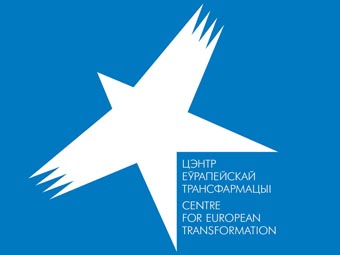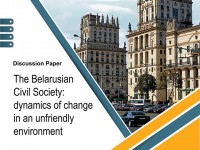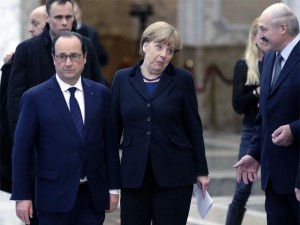We present a Discussion paper of dynamics of changes in the Belarusian civil society in 2015-2017.
The European Dialogue on Modernization: the current status and development problems (Policy paper)

The European Dialogue on Modernization with Belarusan society (EDM) was declared on 29 March 2012 by the EU Commissioner for Enlargement and European Neighborhood Policy Štefan Füle. The initiative offers a new format of relations between Belarus and the EU in addition to the existing tools.
For the moment, it is not quite clear whether this initiative will be able to lead to real changes in Belarus and in its relations with the EU, or whether it is doomed to repeat the infaust destiny of the previous initiatives. The development of the European Dialogue on Modernization faces a problem characteristic of Belarus — the problem of the absence of coordination of Belarusan political actors’ actions. It concerns not only traditional antagonism between the authoritarian state and the democratic opposition, but antilogous keynotes inside the opposition as well. The efficiency of the EDM depends on coordinated support on the part of inner Belarusan public and political subjects and Belarusan citizens.
The factual material depicting the development of the initiative allows the author to substantiate the necessity of the convention and coordination of the position of various subjects, which is to actually set the stage for modernization reforms in Belarus (conventional modernization). Conventional modernization is contraposed to authoritarian modernization as a possible way of reforming Belarus’ economy while the current political regime is preserved. Although there are certain benefits of such modernization for the growth of the population’s well-being, the country as a whole incurs great expenses: the preservation of authoritarianism undermines the bases of Belarus’ normal development in the long view. The movement on the way of conventional modernization will require, first of all, widening the representation of Belarusan public stakeholders in the European Dialogue on Modernization. In particular, in order to increase the transformational potential of the EDM, it is proposed to eliminate the strategic laxity of this initiative and to conceptually fix the EDM development purposes and principles, to carry out a structural reorganization of the EDM and to create in addition to the expert level a special level for stakeholders’ communication, as well as to launch a wide media program aimed at promoting the ideas of the European way of modernization in Belarusan society.
Download text 
Others
-
Belarusan human rights defenders’ view on human rights activity and questions of cooperation between Belarusan human rights organizations
We present a research results report of Belarusan human rights organizations sector.
-
Social base of transformation programs in Belarus
We present a sociological research report (abridged version) of social base of transformation programs in Belarus.
-
Potential and opportunities for launching in Belarus the mechanisms to enjoyment of all human rights by persons with disabilities
We present a research results report (abridged version) of potential and opportunities for launching in Belarusan regions the mechanisms of local planning to promote, protect and ensure the full and equal enjoyment of all human rights and fundamental freedoms by all persons with disabilities.
-
Civil society’s role and place in the system of donor assistance to Belarus (2006-2014)
The Centre for European Transformation has prepared a working paper on civil society’s role and place in the system of external assistance to Belarus in 2006-2014.








Comments
From farewell to a new Eastern policy and towards a new development
Poland and Germany were both initiators and drivers of a New Eastern policy linked to the Eastern neighborhood and Russia/Soviet Union.